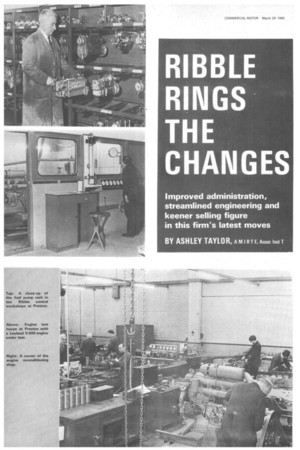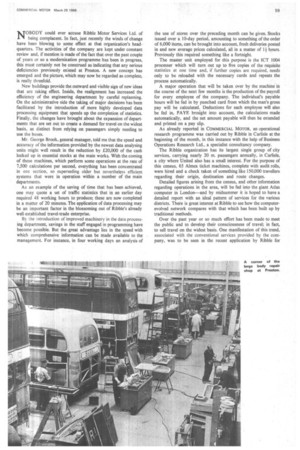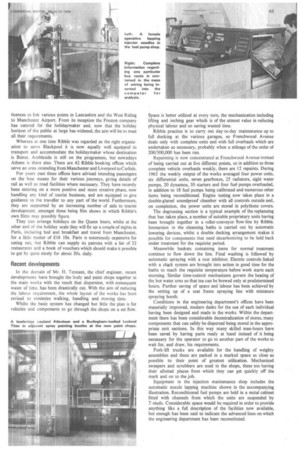RIBBLE RING THE CHANGES
Page 60

Page 61

Page 65

If you've noticed an error in this article please click here to report it so we can fix it.
Improved administration, streamlined engineering and keener selling figure in this firm's latest moves
BY ASHLEY TAYLOR, AMIRT E, Assoc hist T NOBODY could ever accuse Ribble Motor Services Ltd. of being complacent. In fact, just recently the winds of change have been blowing to some effect at that organization's headquarters. The activities Of the company are kept under constant review and, if mention is made of the fact that over the past couple of years or so a modernization programme has been in progress, this must certainly not be construed as indicating that any serious deficiencies previously existed at Preston. A new concept has emerged and the picture, which may now be regarded as complete, is really threefold.
New buildings provide the outward and visible sign of new ideas that are taking effect. Inside, the realignment has increased the efficiency of the engineering department by careful replanning. On the administrative side the taking of major decisions has been facilitated by the introduction of more highly developed data processing equipment that speeds up the completion of statistics. Finally, the changes have brought about the expansion of departments that are set out to create a demand for travel on the widest basis, as distinct from relying on passengers simply needing to use the buses.
Mr. George Brook, general manager, told me that the speed and accuracy of the information provided by the newest data analysing units might well result in the reduction by £20,000 of the cash locked up in essential stocks at the main works. With the coming of these machines, which perform some operations at the rate of 7,500 calculations per second, everything has been concentrated in one section, so superseding older but nevertheless efficient systems that were in operation within a number of the main departments.
As an example of the saving of time that has been achieved, one may quote a set of traffic statistics that in an earlier day required 48 working hours to produce; these are now completed in a matter of 20 minutes. The application of data processing may be an important factor in the blossoming out of Ribble's already well-established travel-trade enterprise.
By the introduction of improved machinery in the data processing department, savings in the staff engaged in programming have become possible. But the great advantage lies in the speed with which comprehensive information can be Made available to the management. For instance, in four working days an analysis of the use of stores over the preceding month can be given. Stocks issued over a 10-day period, amounting to something of the order of 6,000 items, can be brought into account, fresh deliveries posted in and new average prices calculated, all in a matter of 14 hours. Previously this required something like a fortnight.
The master unit employed for this purpose is the ICT 1004 processer which will turn out up to five copies of the requisite statistics at one time and, if further copies are required, needs only to be reloaded with the necessary cards and repeats the process automatically.
A major operation that will be taken over by the machine in the course of the next few months is the production of the payroll for every employee of the company. The individual's payable hours will be fed in by punched card from which the man's gross pay will be calculated. Deductions for each employee will also be fed in, PAYE brotight into account, the calculations made automatically, and the net amount payable will then be extended and printed on a pay slip.
As already reported in COMMERCIAL MOTOR, an operational research programme was carried out by Ribble in Carlisle at the beginning of the month, in this instance with the help of Business Operations Research Ltd., a specialist consultancy company.
The Ribble organization has its largest single group of city services, carrying nearly 20 m. passengers annually, in Carlisle, a city where United also has a small interest For the purpose of this census, 65 Almex ticket machines, complete with audit rolls, were hired and a check taken of something like 150,000 travellers regarding their origin, destination and route changes.
Detailed figures arising from the census, and other information regarding operations in the area, will be fed into the giant Atlas computer in London—and by midsummer it is hoped to have a detailed report with an ideal pattern of services for the various districts. There is great interest at Ribble to see how the computerevolved network compares with that which has been built up by traditional methods.
Over the past year or so much effort has been made to meet the public and to develop their consciousness of travel; in fact, to sell travel on the widest basis. One manifestation of this trend, associated with the conventional services provided by the company, was to be seen in the recent application by Ribble for licences to link various points in Lancashire and the West Riding to Manchester Airport. From its inception the Preston company has catered for the holidaymaker and, now that the holiday horizon of the public at large has widened, the aim will be to meet all their requirements.
Whereas at one time Ribble was regarded as the right organization to serve Blackpool it is now equally well equipped to transport and accommodate the holidaymaker whose destination is Beirut. Ambleside is still on the programme, but nowadays Athens is there also. There are 42 Ribble booking offices which serve an area extending from Manchester and Liverpool to Carlisle.
For years past these offices have advised intending passengers on the best means for their various journeys, giving details of rail as well as road facilities where necessary. They have recently been entering on a more positive and more creative phase, now handling any kind of tourist business, and are equipped to give guidance to the traveller to any part of the world. Furthermore, they are supported by an increasing number of aids to tourist development, amongst these being film shows in which Ribble's own films may possibly figure.
They can arrange holidays on the Queen liners, whilst at the other end of the holiday scale they will fix up a couple of nights in Paris,. including bed and breakfast and travel from Manchester, for a little matter of £.16 10s. Paris is notoriously expensive for eating out, but Ribble can supply its patrons with a list of 32 restaurants and a book of vouchers which should make it possible to get by quite nicely for about 20s. daily.
Recent developments In the domain of Mr. H. Tennant, the chief engineer, recent developments have brought the body and paint shops together in the main works with the result that dispersion, with consequent waste of time, has been drastically cut. With the aim of reducing the .labour requirement, the whole layout of the works has been revised to minimize walking, handling and moving time.
Whilst the basic system has changed but little the plan is for vehicles and components to go through the shops on a set flow. Space is better utilized at every turn, the mechanization including lifting and inching gear which is of the utmost value in reducing physical labour and so saving wasted time.
Ribble practice is to carry out day-to-day maintenance up to full docking at the various garages, so Frenchwood Avenue deals only with complete units and with full overhauls which are undertaken as necessary, probably when a mileage of the order of 200/300,000 has been run.
Repainting is now concentrated at Frenchwood Avenue instead of being carried out at five different points, so in addition to three complete vehicle overhauls weekly, there are 12 repaints. During 1965 the weekly output of the works averaged four power units, six differential units, seven gearboxes, 25 radiators, eight water pumps, 20 dynamos, 30 starters and four fuel pumps overhauled, in addition to 18 fuel pumps being calibrated and numerous other items being reconditioned. Engine testing now takes place in a double-glazed soundproof chamber with all controls outside and, on completion, the power units are stored in polythene covers.
The degreasing section is a typical example of the replanning that has taken place, a number of suitable proprietary units having been brought together in a roller-conveyor flow-line by Ribble. Immersion in the cleansing baths is carried out by automatic lowering devices, whilst a double decking arrangement makes it possible for components that need decarbonizing to be held back under treatment for the requisite period.
Meanwhile baskets containing items for normal treatment continue to flow down the line. Final washing is followed by automatic spraying with a rust inhibitor. Electric controls linked with a cictck system are brought into action in good time for the baths to reach the requisite temperature before work starts each morning. Similar time-control mechanisms govern the heating of the hot water urns so that tea can be brewed only at predetermined hours. Further saving of space and labour has been achieved by the setting up of a seat frame spraying line with miniature spraying booth.
Conditions in the engineering ,department's offices have been materially improved, modern desks for the use of each individual having been designed and made in the works. Within the department there has been considerable decentralization of stores, many components that can safely be dispersed being stored in the appropriate unit sections. In this way many skilled man-hours have been saved by having parts ready at hand instead of it being necessary for the operator to go to another part of the works to wait for, and draw, his requirements.
Fork-lift trucks are available for the handling of weighty assemblies and these are parked in a marked space as close as possible to their point of greatest utilization. Mechanized sweepers and scrubbers are used in the shops, these too having their allotted places from which they can get quickly off the mark and on to the job.
Equipment in the injection maintenance shop includes the automatic nozzle lapping machine shown in the accompanying illustration. Reconditioned fuel pumps are held in a metal cabinet fitted with channels from which the units are suspended by T-studs. Considerable space would be required in order to provide anything like a full description of the facilities now available, but enough has been said to indicate the advanced lines on which the engineering department has been reconstituted.




















































































































